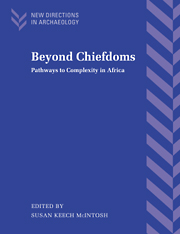Book contents
- Frontmatter
- Contents
- List of figures
- List of tables
- List of contributors
- Preface
- 1 Pathways to complexity: an African perspective
- 2 The segmentary state and the ritual phase in political economy
- 3 Perceiving variability in time and space: the evolutionary mapping of African societies
- 4 Western representations of urbanism and invisible African towns
- 5 Modeling political organization in large-scale settlement clusters: a case study from the Inland Niger Delta
- 6 Sacred centers and urbanization in West Central Africa
- 7 Permutations in patrimonialism and populism: The Aghem chiefdoms of Western Cameroon
- 8 Wonderful society: the Burgess Shale creatures, Mandara polities, and the nature of prehistory
- 9 Material culture and the dialectics of identity in the Kalahari: AD 700–1700
- 10 Seeking and keeping power in Bunyoro-Kitara, Uganda
- 11 The (in)visible roots of Bunyoro-Kitara and Buganda in the Lakes region: AD 800–1300
- 12 The power of symbols and the symbols of power through time: probing the Luba past
- 13 Pathways of political development in equatorial Africa and neo-evolutionary theory
- Index
3 - Perceiving variability in time and space: the evolutionary mapping of African societies
Published online by Cambridge University Press: 14 October 2009
- Frontmatter
- Contents
- List of figures
- List of tables
- List of contributors
- Preface
- 1 Pathways to complexity: an African perspective
- 2 The segmentary state and the ritual phase in political economy
- 3 Perceiving variability in time and space: the evolutionary mapping of African societies
- 4 Western representations of urbanism and invisible African towns
- 5 Modeling political organization in large-scale settlement clusters: a case study from the Inland Niger Delta
- 6 Sacred centers and urbanization in West Central Africa
- 7 Permutations in patrimonialism and populism: The Aghem chiefdoms of Western Cameroon
- 8 Wonderful society: the Burgess Shale creatures, Mandara polities, and the nature of prehistory
- 9 Material culture and the dialectics of identity in the Kalahari: AD 700–1700
- 10 Seeking and keeping power in Bunyoro-Kitara, Uganda
- 11 The (in)visible roots of Bunyoro-Kitara and Buganda in the Lakes region: AD 800–1300
- 12 The power of symbols and the symbols of power through time: probing the Luba past
- 13 Pathways of political development in equatorial Africa and neo-evolutionary theory
- Index
Summary
Archaeologists of my generation have experienced dramatic shifts in the ideas that orient our field – as students in the early 1970s we cut our teeth on the New Archaeology, and many embraced the neo-evolutionary models that informed a processual understanding of human development. The musty culture history of our instructors' elders seemed uninteresting, and our imaginations were fired by questions of origins and transitions: the origins of food production and the transition to sedentary village life; the origins of complex societies and the growth of cities. We were concerned with modeling, with cross-cultural comparison, and ultimately with processual questions of evolutionary change. During the 1980s we weathered another sea-change in theoretical currents with the upwelling of critical stances loosely grouped under the rubric of post-processual archaeology. Although this belies the diverse perspectives of archaeologists so-labeled – some marxist, some feminist, some post-structuralist (Kohl 1993) – they share a disdain for the evolutionary models that played a prominent role in processual archaeology. They criticize evolutionary models as universalizing, winnowing diversity by forcing an array of societies into rigid types; as hierarchical, ranking societies along dimensions of complexity and heterogeneity; as reductionist, implying a correlation between particular economic and social forms; and, as distancing simple societies in time by treating them as relics of earlier stages (Andah 1995; Shennan 1993; Thomas 1989; Upham 1990a, 1990b;Yoffee 1993). Others have examined the relationship of evolutionary ideas with imperialism, ethnocentrism, and inequalities of power (Bowler 1992; Fabian 1983; Gamble 1992a, 1992b; Rowlands 1989b, 1994; Schmidt and Patterson 1995; Stocking 1987; Thomas 1994; Trigger 1989). Thus progressive evolutionary schemes map societies in ways that are ideologically charged.
- Type
- Chapter
- Information
- Beyond ChiefdomsPathways to Complexity in Africa, pp. 39 - 55Publisher: Cambridge University PressPrint publication year: 1999
- 32
- Cited by



